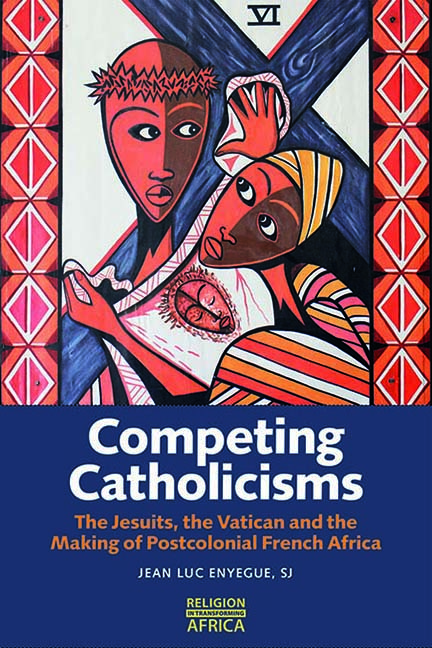Book contents
- Frontmatter
- Dedication
- Contents
- List of Illustrations
- Acknowledgements
- List of Abbreviations
- Glossary
- Chronology of Jesuit Missions in Chad and Cameroon
- Introduction: The End of the Jesuit Mission in Africa?
- Part I The Jesuit Project in West Africa: French Catholicism and Colonialism in Chad, 1935–58
- Part II The Outward Mission: Education and Competing Catholicisms
- Part III The Postcolonial Mission and Catholicity: From Chad to Cameroon, 1962–78
- Conclusion
- Bibliography
- Index
- Previously published titles in the series
9 - Era of Dissent: Cameroonian Jesuits and Global Catholicism, 1974–78
Published online by Cambridge University Press: 16 July 2022
- Frontmatter
- Dedication
- Contents
- List of Illustrations
- Acknowledgements
- List of Abbreviations
- Glossary
- Chronology of Jesuit Missions in Chad and Cameroon
- Introduction: The End of the Jesuit Mission in Africa?
- Part I The Jesuit Project in West Africa: French Catholicism and Colonialism in Chad, 1935–58
- Part II The Outward Mission: Education and Competing Catholicisms
- Part III The Postcolonial Mission and Catholicity: From Chad to Cameroon, 1962–78
- Conclusion
- Bibliography
- Index
- Previously published titles in the series
Summary
The rebirth of missionary Christianity addressed in the previous chapters existed even in a place like Cameroon, when Cameroonians were leaders of Africanisation in the entire continent, but were still ruled or controlled by White missionaries. These Cameroonians fought to have churches adapted to their specific context and needs. Ossama's report of 1968 on the creation of the Cameroon Jesuit Region made it an ‘absolute necessity’ that the major superior of the region be African. So, when the VPAO was created in 1973, with a map that reconstructed colonial boundaries and a White man as superior, African Jesuits dissented.
The case of Emmanuel Teguem discusses this dissent and broadens the debate beyond governance to the more profound roots of racial and class inequalities. These challenges are significant, and the effectiveness of Christianity transforming Africa is contingent on the ability to tackle them. African dissent, this chapter argues, cannot be comprehended fully unless one situates Africa and its people in the global divide that characterised the world and the Church in the 1970s, as well as the racial and social inequalities that prevailed.
In a world broken by injustice and inequalities, African Jesuits believed that to make the Church truly African meant something beyond cultural or liturgical adaptation. Africanising the Church also meant liberating Africans from the yoke of injustice, feeding the hungry, healing the sick, and caring for the poor. Christianity, to be credible in Africa, had to transform African lives and societies.
The focus on social transformation, however, exposed a divide among the Jesuits, and within Christianity globally. Some Jesuits believed that priestly ministries excluded social work and social activism. These Jesuits were joined by critiques of development Christianity. In a few cases, these critiques equated the social gospel of the 1970s with Marxism. Others simply accused the Catholic Church of becoming a global non-governmental organisation (NGO) at the expense of true evangelism. For the first African Jesuits and for the 31st and 32nd GC of their order, social work was essential to the Jesuit mission and identity. Evangelism was primarily witnessing the gospel, which included social transformation and the possibility of giving one's life for the sake of justice.
- Type
- Chapter
- Information
- Competing CatholicismsThe Jesuits, the Vatican and the Making of Postcolonial French Africa, pp. 226 - 254Publisher: Boydell & BrewerPrint publication year: 2022



